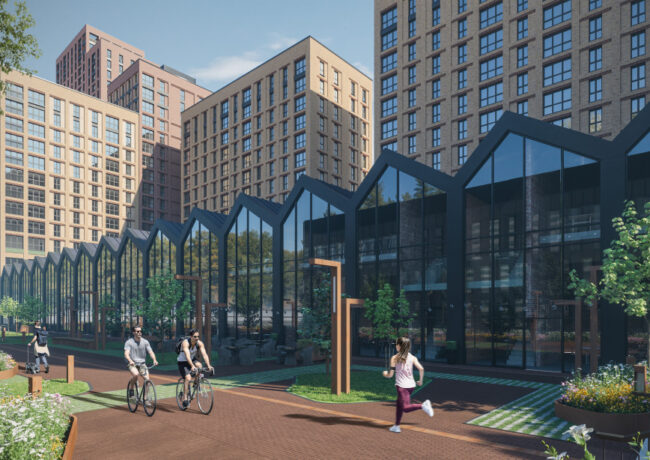Mixed recovery outlook for Manchester and Liverpool
Manchester’s buoyant residential market has helped to keep the city’s property industry afloat in recent months, while Liverpool has remained broadly resilient, but the latest Covid restrictions are worrying, said consultancy Avison Young.
The company’s UK Cities Recovery Index, which assesses nine UK cities’ prospects for economy recovery after the pandemic, found that Manchester recorded the second largest increase in number of residential sales listings between 1 March and 1 September, after London, “exceeding expectations”.
However, like other large UK cities, Manchester’s exposure to the office sector has held back economic recovery as offices have remained largely closed, impacting on city centre commercial activity.
In particular, city centre retail footfall has fallen well below the UK average after a spike at the end of July, with the index reading for Manchester sitting at 52.5 on 27 September against a national average of 74.6, according to Avison Young’s report.
The hotel and leisure sector has also taken a battering, with falling numbers of restaurant booking and cinema revenues recorded in recent months. The sector saw a steep rise during July and August due to the Eat Out to Help Out scheme, to an index reading of 107.7 on 31 August but this now stands at 93.1.
Chris Cheap, principal and managing director at Avison Young in Manchester, said: “Manchester’s vibrant cultural, leisure, creative, tech and educational mix contributes significantly to its economic performance, so as we navigate through the ongoing effects of Covid-19, it is critical that any recovery plan maintains the diverse ‘Manchester experience’ to sustain the broad sectoral spectrum of commercial real estate demand the city has traditionally seen.”

Avison Young’s Cheap
Cheap added: “People are central to Manchester’s pull, and it is vital that any new policy and recovery efforts reflect this through progressive planning via the public and private sector working together to build back better for the long term good of communities.”
Meanwhile, in Liverpool, the residential sector plateaued during the Covid lockdown, but has since risen and then remained steady with an index reading of 111.0 as of 27 September, suggesting that the sector has been “performing well since the end of February”, according to the report.
Multiple other industry sectors have remained largely resilient in recent months, with Avison Young’s general commercial activity sector index “robust” at 99.7, largely due to the Port of Liverpool remaining operational, the consultancy said.
However, levels of “mobility” in the city – including walking, driving and other transit modes – have dipped 6.5% since 21 September, the day before further lockdown restrictions came into effect, as has levels of hotel and leisure industry activity.
“The implementation of the recent increased restrictions for Merseyside has resulted in further decline, and this will plainly be exacerbated by the announcement of further restrictions on [1 October],” the report said.
Stephen Cowperthwaite, principal and managing director of Avison Young’s Liverpool office, said: “Liverpool offers so much in terms of its cultural, heritage and sporting offer, [as well as] retail, leisure, conferences and cruise liners.
“However, the effects of Covid-19 have had a significant impact on the tourism, hospitality and construction sectors that have been so important to Liverpool’s resurgent economy in recent years.

Cowperthwaite of AY
“We began to see signs of a cautious recovery over the summer, but with schemes such as Eat Out to Help Out now over, stricter local restrictions now in place and as we head into the winter months, it is a critical time to assess how the city responds.
“The time to act is now to ensure that we bounce back well and build a sustainable and inclusive economy.”
The index can be found here.





Has Liverpool ever recovered since managed decline? The corridors of power for some reason just don’t like Liverpool.
By Michael McDonut
It’s a conspiracy! Or maybe it’s just bad leadership not able to fight it out for the left overs and scraps from London.
By Anonymous
“Managed decline” didn’t happen, it was one line in one letter and was thrown out. Like them or hate them (I hate them), the 1980s government ploughed enormous sums of public money into Liverpool, and we haven’t done badly out of them since. The difference down the M62 is that Manchester has been much more open to inward investment – for better or for worse.
By Kidda
We’re all going to get poorer and more cramped, but the street food burgers will be fabulous. Cheers to the future.
By Anonymous
Not true on Manchester.
Unfortunately it is one of the worst boroughs impacted by unsafe cladding on residential blocks. Around 85% of 5 year old flats are unmortgageable and unsellable. The market has completely crashed and there is very little on the market and few people who can move up a notch on the ladder.
By Resident Eville
I say this as an ardent Labour supporter and despiser of Thatcherism – there was no such thing as “managed decline” in Liverpool. While it was floated as an option by her government, Heseltine saw the potential of Liverpool and prevented it from happening. His efforts were crucial to the regeneration that took place.
Yes more could have been done, but that’s a different discussion.
By Anonymous
It has been evident for some time that Liverpool is not the favoured city in the NW, either by Labour or Tory governments , thus central government regional officers are based in Mcr , and that has benefited them, also , foe example , locating of many further BBC jobs in Mcr has helped swell the media related jobs there and sucked many other well paid professions in.
Therefore with the local economy fattened up the ability to survive a downturn is far greater than in Liverpool, however despite the setbacks we keep coming back and hopefully once Brexit kicks in and Covid subsides Liverpool can claw its way back, as we do have lots of really good , visionary entrepreneurs in the city, and they deserve to succeed
By Anonymous
I think people will be happy that they don’t have to work in horrible city centres anymore.
By Dan
The picture above is Parliament Square. It’s in the Baltic: the heart of Liverpool’s digital economy. People like Liverpool, it’s a very attractive cultural destination. It has changed beyond measure in the last 30 years and has capitalised on its unique assets. All of those assets will still be there when this settles down and Liverpool will bounce back stronger.
By Roscoe
Michael, quit the constant negativity. It’s nauseating. Yes the BT deal is a bit of a blow but the negativity serves nothing but to support this city’s detractors view that we are all a bunch of whiners, which couldn’t be further from the actual truth.
By CMW
If it wasn’t for Heseltine Albert Dock would’ve been a car park.
By Loganberry
Michael Heseltine , should be officially honoured (Freeman) by the City of Liverpool for what he did. He stood up against the Thatcher government in defiance of negativity, he had the vision that our great city would one day grow and develop. That vision is now to be seen, with development in the city centre continuing and the plans in place for Riverside (Peel Development) the Everton FC stadium and growth on the Wirral , the future looks good. Thanks to Heseltine’s intervention.
By Steve Musa
Liverpool should break away from the ‘northwest’ region and start to carve its own stronger national identity to rival the positive international one it has and stop being held back by notions of ‘regional capitals’ that appear to funnel all focus and thereby investment into these fortunate few cities – the latest being Leeds hot on the heels of Channel 4 randomly receiving a Tory northern HQ despite being a thorughly Labour city.
Like every other political move in the north from the ‘northern way’ to HS2 and now levelling up Liverpool will no doubt be framed through the same prism as peripheral and the same cities will get the goodies, and that’s the pattern we need to change.
By Michael McMoanalot
@Steve Musa, Re Lord Heseltine, he was awarded the freedom of Liverpool several years ago, I know because I was at the Town Hall ceremony. He is a true and great friend of Liverpool, a rarity in the Conservative party.
By Liverpolitis
Liverpool is still the best city in the UK beleive me I have lived in both Manchester, Birmingham, London and came back to Liverpool last year the other cities dont compare to the Liverpool buzz and people, good and bad in all cities, Manchester possibly has the worst crime rate out of all the places and this is true whether you like it or not , the problem with Mancunians is they think Manchester is something it’s not and they try to put other places down to make their city look better and desperate to be noticed which comes across a little desperate , Liverpool does not do this the buzz is there thats what makes it unique with a great buzz, people from all over the world including Manchester are all welcome which from my experience of Living in Manchester is differently.
Just because another City up the road has a few more office blocks and a few more floors in boxes certainly don’t make it a better city thats just dumb.
Liverpool is coming on just fine it hasn’t stopped biulding and it will be forever growing , its a beautiful famous city that is recognised around the world and about to become the next Hollywood.
By Adamm
Agree with Steve. Heseltine did more for the North West than 13 years of Labour ever did.
By Elephant
@SteveMusa – Lord Heseltine was made a freeman of the city in March 2012 – by the Labour administration.
He’s extremely well-regarded hereabouts for the outstanding commitment to Liverpool. Fair play to the fella.
By Sceptical
deluded
By @adamm